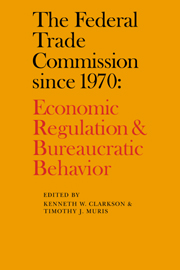Book contents
- Frontmatter
- Contents
- List of contributors
- Preface
- 1 Introduction
- Part I The institutional setting
- Part II Nature and consequence of FTC actions
- Introduction
- 6 Bureau of Competition: antitrust enforcement activities
- 7 Information for antitrust and business activity: line-of-business reporting
- 8 Industry structure investigations: Xerox's multiple patents and competition
- 9 Exclusionary practices: shopping center restrictive covenants
- 10 Legislative powers: FTC rule making
- 11 Rewriting consumer contracts: creditors' remedies
- 12 Regulating postpurchase relations: mobile homes
- 13 Regulating information: advertising overview
- 14 Special statutes: the structure and operation of the Magnuson-Moss Warranty Act
- Part III Conclusions and reforms
- Notes
- Selected bibliography
- Index
13 - Regulating information: advertising overview
Published online by Cambridge University Press: 05 November 2011
- Frontmatter
- Contents
- List of contributors
- Preface
- 1 Introduction
- Part I The institutional setting
- Part II Nature and consequence of FTC actions
- Introduction
- 6 Bureau of Competition: antitrust enforcement activities
- 7 Information for antitrust and business activity: line-of-business reporting
- 8 Industry structure investigations: Xerox's multiple patents and competition
- 9 Exclusionary practices: shopping center restrictive covenants
- 10 Legislative powers: FTC rule making
- 11 Rewriting consumer contracts: creditors' remedies
- 12 Regulating postpurchase relations: mobile homes
- 13 Regulating information: advertising overview
- 14 Special statutes: the structure and operation of the Magnuson-Moss Warranty Act
- Part III Conclusions and reforms
- Notes
- Selected bibliography
- Index
Summary
This chapter examines the legal rules that the FTC has evolved to judge advertising. The FTC has set the wrong objective for these rules in that the agency has tried to increase the reliability of all advertising, both the kind that consumers use as a complement or guide to their own product search activities and the kind that consumers use as a substitute for their own search. Instead, the agency should police only the reliability of the “search substitute” kind of advertising. This is the approach of the common law of fraud. FTC advertising rules based on this approach would be more enforceable for the agency, more predictable to advertisers, and more beneficial to consumers.
Section I summarizes the relevant economic principles. Section II describes the common-law approach in terms of these principles. Section III describes current FTC advertising doctrines, analyzes their consumer welfare consequences relative to the common-law approach, and proposes two alternative kinds of regulatory reform.
The economics of deceptive advertising
The theory of advertising
The main economic justification for advertising is that it reduces consumer search costs and makes consumer search more effective. Consumers constantly expend resources to find the goods and services that best serve their wants. Any device that reduces these search costs produces benefits. Aside from the direct benefit of the time and other resources that consumers save, consumers receive two other benefits from advertising.
- Type
- Chapter
- Information
- The Federal Trade Commission since 1970Economic Regulation and Bureaucratic Behavior, pp. 222 - 245Publisher: Cambridge University PressPrint publication year: 1981
- 5
- Cited by



